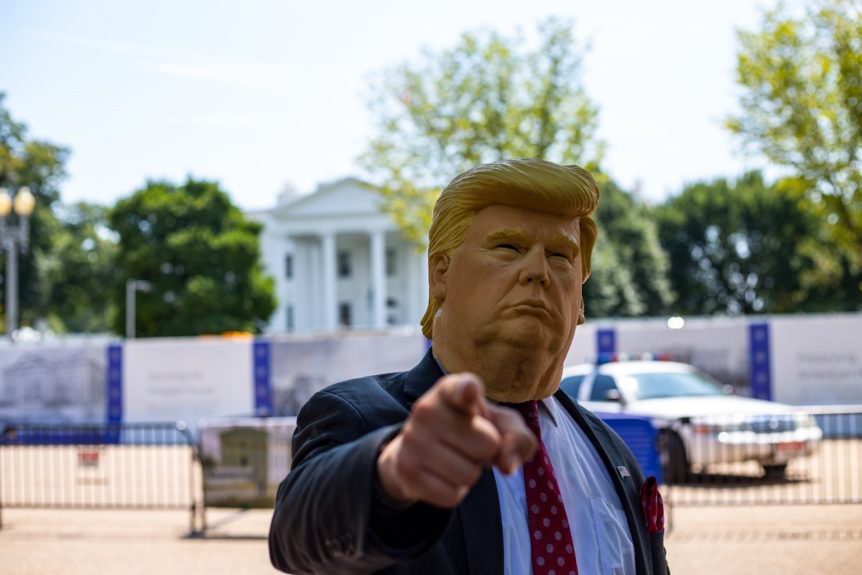Donald J. Trump became the first president in the history of the United States to face impeachment twice. The initial impeachment was over allegations of improperly seeking help from Ukraine to bolster his chances of getting re-elected into office.
The second time was over his alleged role in inciting his Republican supporters to storm the Capitol, an event that was documented live on national TV and social media.
As far as the first impeachment goes, the question on most people’s minds is how a foreign nation in Eastern Europe could have threatened the future of Trump’s presidency. This article takes an in-depth look at how the two are related.
Trump Ukraine Extortion – Background
To understand why Trump was impeached the first time, you first need to understand how he got there in the first place. He stated that on July 25, 2019, he called his Ukrainian counterpart, the then newly-elected President Volodymyr Zelensky, to congratulate him on winning the election. Zelensky, a former television star with no prior experience in the murky world of politics, had been elected to office a few months before the now-infamous phone call from Trump.
Trump Ukraine Whistleblower
This telephone exchange did not sit right with an anonymous whistleblower, alleged to be a CIA agent. In the formal complaint lodged on August 12, 2019, the whistleblower stated that although they did not listen in on the conversation between the two heads of state, their account was similar to that of a dozen other officials who claim to have first-hand accounts of the conversation. Among them was Mike Pompeo, the sitting Secretary of State at the time.
Trump’s phone call to Zelensky occurred a few days after he blocked military aid to Ukraine worth $391 million. According to critics, this move was seen as a bargaining chip President Trump could use to sway Zelensky.
The whistleblower further accused Trump of abuse of Presidential power, alleging that he used the power of the White House to solicit a foreign nation to interfere with the 2020 presidential election.
According to the whistleblower, the phone call between Trump and Zelensky was deeply disturbing, and they felt they had no choice but to act on it.
Transcript of Trump Call to Ukraine
As the controversy continued to gather momentum, there was mounting pressure to release the transcript of Trump’s call to Ukraine. Trump promised to release the full, unredacted details of the phone call to the public to prove that nothing was inappropriate about their conversation.
It later emerged that the information released by the White House was not a verbatim account of the conversation but rather notes detailing what was allegedly discussed by the two. This move did not do much to quell the controversy that was now spiraling out of control.
Based on the notes shared with the public, Trump was urging Zelensky to launch investigations into the alleged corruption claims against Joe Biden, who was at the time a former Vice President and front runner in the upcoming 2020 presidential bid, as well as Biden’s son Hunter.
Trump asserted that in 2015, Biden used his influence as Vice President in Obama’s administration to get Ukraine’s top prosecutor fired. The prosecutor in question had been looking into the dealings of a major energy company in which Hunter Biden had been employed.
Hunter had faced widespread criticism for working with foreign-owned multinationals while his father was Vice President, suggesting a potential conflict of interest. There was no evidence of Biden taking any measures that would intentionally benefit Hunter.
Hunter further denied any wrongdoing, with Ukrainian authorities stating that they did not have concrete evidence suggesting that Hunter had broken any laws.
What Was Trump’s Abuse of Power?
A sitting president of one country pressuring the leader of a foreign nation to re-open investigations into allegations that have already been discredited is a significant issue. Trump’s actions against Biden were tantamount to abuse of power since Biden would be his leading rival in the elections slated for the following year. The fact that he was seemingly colluding with a foreign power to influence the outcome of a presidential election is against the law.
With this knowledge in hand, the Democrats launched an inquiry into the Trump-Ukraine affair. Several officials were summoned to testify, including Kurt Volker, the US special envoy to Ukraine. He provided a myriad of communications, including several text message exchanges.
Bill Taylor, the acting ambassador to Ukraine, was also summoned. He disclosed to the inquiry that Trump pegged the release of military aid to the European nation on Ukrainian authorities re-opening investigations into Biden’s dealings in the country. Taylor also alluded to the presence of an “informal and irregular” US policy-making channel in the country. The White House vehemently denied these allegations.
The inquiry then subpoenaed Rudy Giuliani – Trump’s personal lawyer – to hand over all Ukraine-related documents in his possession. Giuliani had been at the heart of pushing the allegations leveled against Biden and his son. Pompeo also received a similar subpoena.
Gordon Sondland Impeachment Testimony
Of all the testimonies heard, the most dramatic one of them all came from the US ambassador to the European Union – Gordon Sondland. He stated that he acted at President Trump’s “express direction” when putting pressure on Ukraine to investigate the discredited allegations against Joe and Hunter Biden. Sondland stated that Trump instructed him to present Zelensky with an offer of a visit to the White House while making it clear that the visit was contingent on him publicly announcing a probe into the Bidens.
Gordon Sondland’s impeachment testimony also implicated former National Security Adviser John Bolton, as well as Pompeo, in the Ukraine affairs.
In December 2019, the Democrats in the House of Representatives brought two impeachment charges against Trump. The first was for abuse of power and the second for obstruction of Congress.
The House proceeded to vote for Trump’s impeachment, after which the Senate held a trial. For a successful conviction, a two-thirds majority vote is required. However, given that Republicans controlled the chamber, a guilty verdict was unlikely.
Trump escaped impeachment by 52 votes to 48 on the first charge and 53 votes to 47 on the second.
Trump Quid Pro Quo
During his presidential tenure, Trump was quoted several times saying that there wasn’t any quid pro quo between the US government and Ukraine. Despite these assertions, there were, in fact, two instances that stood out.
Based on several key documents and volumes of testimony released during the impeachment inquiry that the Democrats launched, it became apparent that the Trump administration made multiple attempts to pressure the Ukrainian government to launch new investigations into discredited allegations in exchange for something. These quid-pro-quo offers proceeded in two distinct phases.
The first instance was the White House visit offer made to President Zelensky in exchange for investigations into the Bidens. The Ukrainian authorities confirmed that they were told on several occasions that Trump would be more than happy to host Zelensky for a meeting in the White House, but only if he directed the Ukrainian investigative agencies to look into Joe Biden and his son.
The Trump administration pressed Ukraine to commit and publicly announce two investigations: Ukraine’s alleged interference in the 2016 US presidential election and Burisma – the energy company that employed Hunter. Zelensky did not yield to this pressure, much to Trump’s dismay.
The second instance was when Trump’s administration withheld $391 million worth of military funding to Ukraine contingent on Zelensky agreeing to launch investigations into the Bidens. President Trump himself issued an order to block the aid sometime around mid-July 2019, alluding to the fact that the suspension came as a result of the ongoing investigations of his phone call with Zelensky. The Ukrainian government only learned of the aid block a month later.
Ukrainians Informed of Trump’s Demands
On July 10, 2019, US and Ukrainian officials had a meeting at the White House. In her testimony, Fiona Hill, a National Security Council (NSC) staffer, stated that when the Ukrainian officials inquired about a potential meeting between the two presidents, Sondland informed them that Mick Mulvaney, the White House chief of staff at the time, had already reached an “agreement” beforehand. He stated that a meeting between the two heads of state would only happen once Ukraine launched investigations into the energy sector in the country.
John Bolton ended the meeting abruptly shortly after, but Sondland led some of the attendees to a different venue to discuss the matter further. In a testimony submitted by Alexander Vindman, an NSC staffer at the time, he stated that Sondland explicitly asked the Ukrainian officials for an investigation of Joe and Hunter Biden, although Hill testified that she did not remember hearing a specific reference to them. She did, however, indicate that she was not present at that particular point during the discussions.
In the two weeks following the meeting, discussions centered on setting up a phone call between Trump and Zelensky. A series of text messages between Kurt Volker and Andriy Yermak (the presidential adviser to Zelensky) emerged, making the quid pro quo quite clear.
Russian Information War 2016

Despite the spiraling controversy of Trump’s connection with Ukraine, it wasn’t the first time he faced scrutiny over his links to foreign powers. His election campaign in 2016 was also under investigation over alleged ties to Russia.
According to an indictment presented to a federal grand jury, a Russian organization dubbed the Internet Research Agency deployed a series of strategies designed to support Trump’s campaign while “disparaging” Hillary Clinton’s bid in the presidential race to the White House.
Some of the tactics used by the agency included widespread identity theft and putting out hundreds of posts on social media and blogs meant to present Clinton in a bad light. The indictment referred to this as information warfare, further revealing that the agency had a $1.2 million monthly budget to work with.
The operation began in 2014 when a group of Russian nationals traveled extensively across the United States in a bid to understand the country’s political landscape and the unique role social media played in it.
The team traveled using fake identities, gathering information that they would later use in their misinformation campaigns. Their main focus was on the states that traditionally swing both ways in elections.
Fake Identities
In early 2016, the Russians stole personally identifiable information from hundreds of American nationals. They stole Social Security Numbers, dates of birth, and home addresses of real Americans, used them to open and operate bank accounts, create fake social media profiles, particularly on Instagram, Facebook, and Twitter, purchase online ads, and even buy banners, flags, and buttons for campaign rallies that they would use close to the elections.
Social Media Warfare
The Russian agency had hundreds of people on its payroll to impersonate ordinary Americans and create social media accounts posing as them. They would then create thematic groups that touched on various issues such as religion, race, and immigration to fuel discord in the election.
Most of the accounts were used to disparage Clinton and support Trump. They were also used to promote certain hashtags such as #TrumpTrain, #Trump2016, #Hillary4Prison, and several others and push allegations of mass voter fraud.
Additionally, the Russians made a concerted push to discourage minority voters from voting in the 2016 elections or pushing them in the direction of third-party candidates who were also running for president.
Three Russian entities and 13 Russian nationals were charged for their respective roles in the scheme. Although the inquiry did not find a criminal conspiracy to interfere with the election, it did not entirely exonerate Trump from obstructing justice. The Russians had no direct contact with Trump’s campaign team, and no evidence was presented that linked Trump to Moscow.
Need more legal advice? Chat with a Laws101 attorney online right now.
